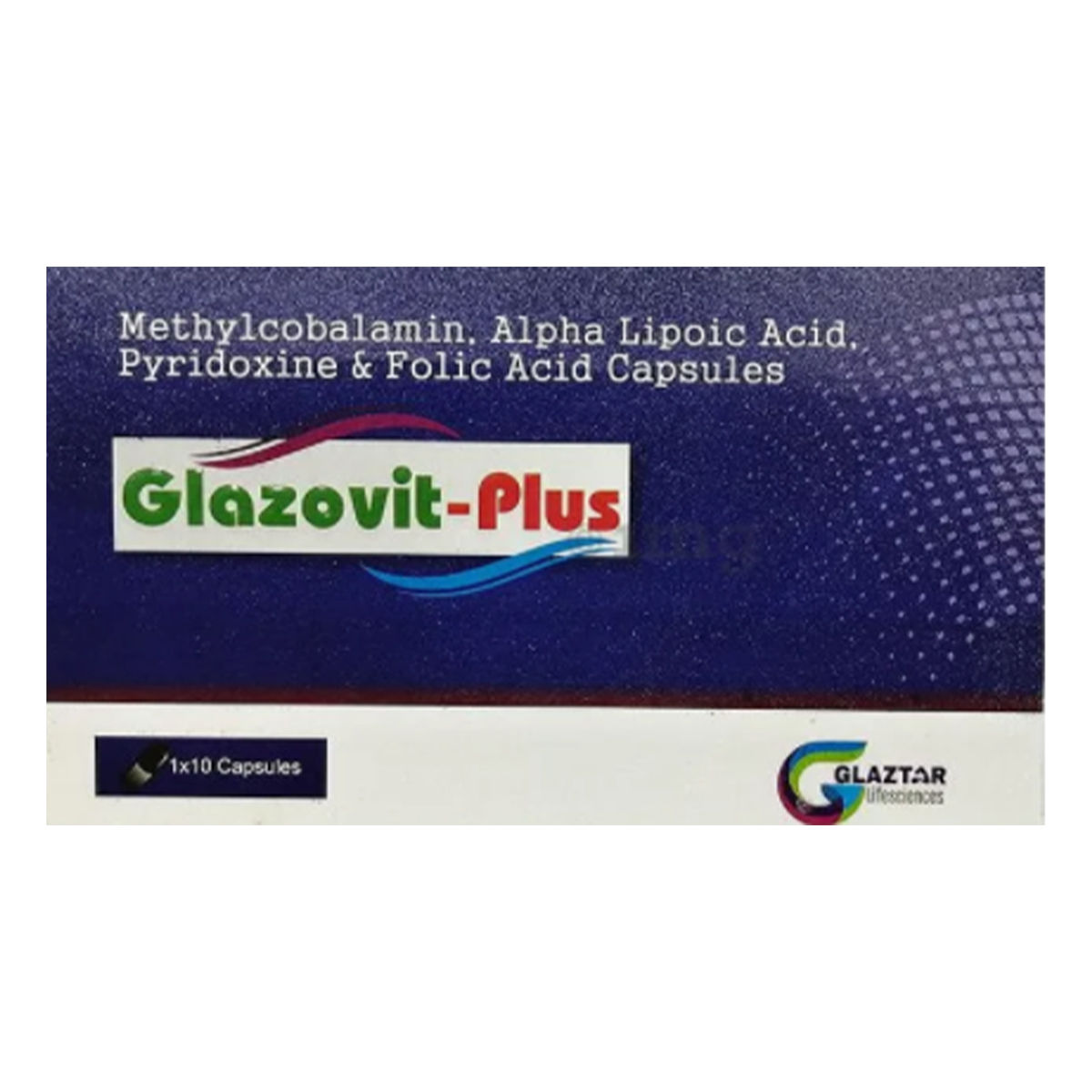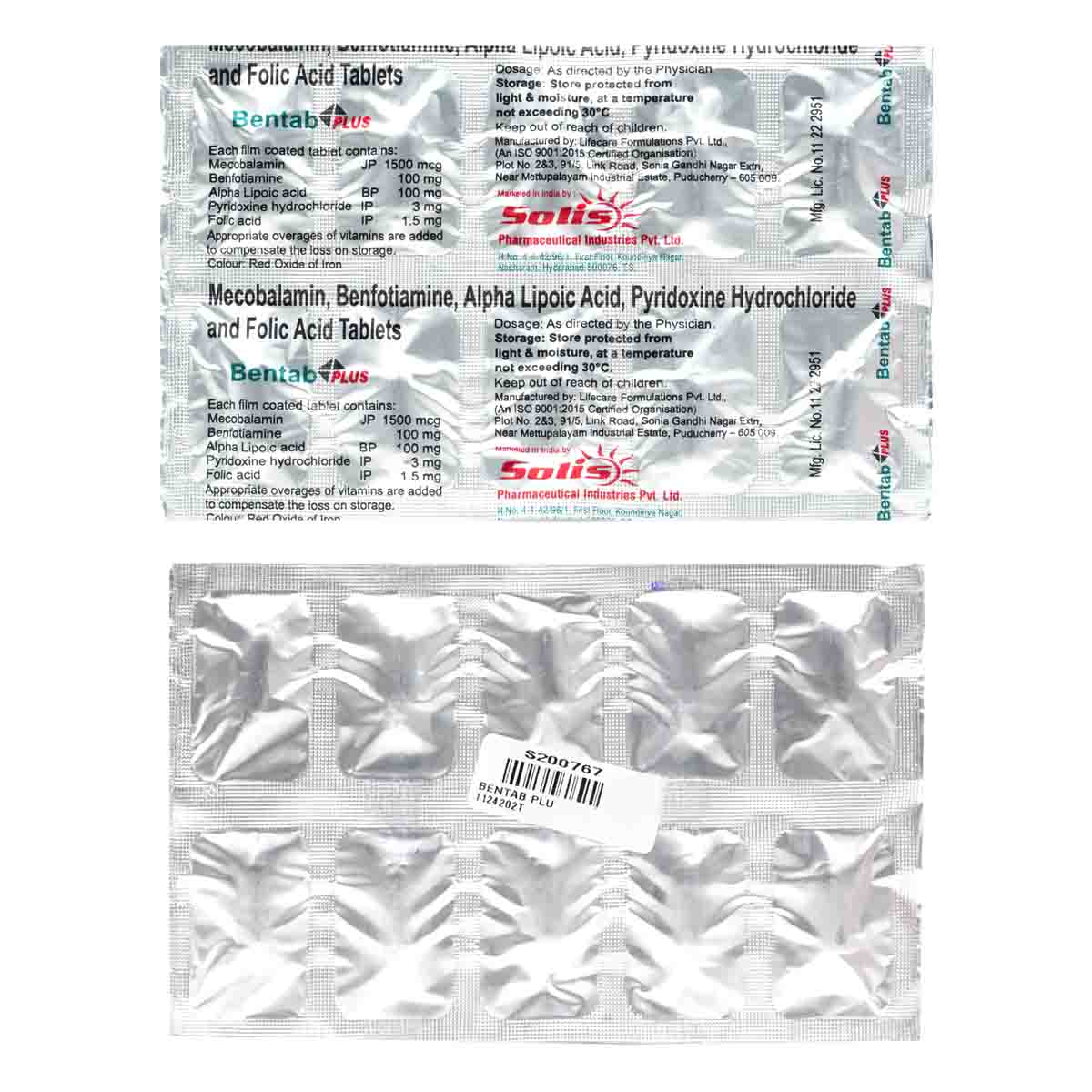FOLIC ACID+METHYLCOBALAMIN+ALPHA LIPOIC ACID
About
FOLIC ACID+METHYLCOBALAMIN+ALPHA LIPOIC ACID belongs to the class of 'nutritional supplements', primarily used to treat nutritional deficiencies. It effectively treats various conditions caused due to lack of vitamins, such as vitamin B12 deficiency, diabetic neuropathy (nerve damage due to diabetes), and peripheral neuropathy (nerve damage in the hands and feet). Nutritional deficiency occurs when the body is unable to absorb or get enough nutrients from food.
FOLIC ACID+METHYLCOBALAMIN+ALPHA LIPOIC ACID contains Alpha lipoic acid, Folic acid, and Methylcobalamin. Alpha-lipoic acid is an antioxidant that prevents cell damage and restores vitamin levels in the body. It also decreases pain and numbness in neuropathy. Folic acid is the synthetic form of folate (water-soluble Vitamin B). It helps form red blood cells and prevents DNA changes that may lead to cancer. Methylcobalamin (Mecobalamin), a form of vitamin B12, regulates body functions, such as cell multiplication, blood formation, and protein synthesis.
Your doctor will decide the dosage based on your medical condition. Sometimes, FOLIC ACID+METHYLCOBALAMIN+ALPHA LIPOIC ACID may have common side effects like nausea, vomiting, diarrhoea, and headache. These side effects do not require medical attention and gradually resolve over time.
Let your doctor know if you use any other medications, including vitamins, before starting FOLIC ACID+METHYLCOBALAMIN+ALPHA LIPOIC ACID. Please tell your doctor if you are allergic to FOLIC ACID+METHYLCOBALAMIN+ALPHA LIPOIC ACID or its components. It is essential to let your doctor know if you are pregnant, planning to conceive, or a breastfeeding mother. Avoid consuming alcohol along with FOLIC ACID+METHYLCOBALAMIN+ALPHA LIPOIC ACID to ensure maximum absorption of nutrients. FOLIC ACID+METHYLCOBALAMIN+ALPHA LIPOIC ACID should be used in children only with the doctor's advice.
Uses of FOLIC ACID+METHYLCOBALAMIN+ALPHA LIPOIC ACID
Medicinal Benefits
FOLIC ACID+METHYLCOBALAMIN+ALPHA LIPOIC ACID is used to treat nutritional deficiencies. It contains Alpha lipoic acid, Folic acid, and Methylcobalamin. Alpha-lipoic acid is an antioxidant that prevents cell damage and also decreases pain and numbness in neuropathy. Folic acid helps form red blood cells and prevents DNA changes that may lead to cancer. It prevents and treats low blood levels of folate (folate deficiency) and high blood levels of an amino acid called homocysteine (hyperhomocysteinemia). Methylcobalamin regulates body functions and helps rejuvenate and protect damaged nerve cells by producing a substance called myelin.
Directions for Use
Storage
Side Effects of FOLIC ACID+METHYLCOBALAMIN+ALPHA LIPOIC ACID
- Nausea
- Vomiting
- Headache
- Diarrhoea
In-Depth Precautions and Warning
Drug Warnings
Let your doctor know if you have any heart, liver or kidney diseases before starting FOLIC ACID+METHYLCOBALAMIN+ALPHA LIPOIC ACID. This supplement should be used during pregnancy only when advised by your doctor. Breastfeeding women should consult their doctor before taking FOLIC ACID+METHYLCOBALAMIN+ALPHA LIPOIC ACID. It is advised to limit the alcohol intake while using FOLIC ACID+METHYLCOBALAMIN+ALPHA LIPOIC ACID. FOLIC ACID+METHYLCOBALAMIN+ALPHA LIPOIC ACID is safe for children only when advised by the doctor. Keep FOLIC ACID+METHYLCOBALAMIN+ALPHA LIPOIC ACID away from direct sunlight. Do not store FOLIC ACID+METHYLCOBALAMIN+ALPHA LIPOIC ACID above 25ºC.
Drug Interactions
Drug-Drug Interaction: FOLIC ACID+METHYLCOBALAMIN+ALPHA LIPOIC ACID may interact with antitumor medicines, anti-cancer drugs (5-fluorouracil, capecitabine), anti-diabetics, anticoagulants, and anticonvulsants (phenobarbital, phenytoin).
Drug-Food Interaction: Please avoid/limit alcohol while using FOLIC ACID+METHYLCOBALAMIN+ALPHA LIPOIC ACID to ensure maximum absorption of nutrients.
Drug-Disease Interaction: Use FOLIC ACID+METHYLCOBALAMIN+ALPHA LIPOIC ACID with medical advice if you have malabsorption syndrome (difficulty absorbing nutrition from food), liver, kidney or heart diseases, and allergic reactions to medicines.
Drug-Drug Interactions Checker List:
Safety Advice

Alcohol
cautionAvoid consuming alcohol along with FOLIC ACID+METHYLCOBALAMIN+ALPHA LIPOIC ACID to ensure maximum absorption of nutrients.

Pregnancy
cautionFOLIC ACID+METHYLCOBALAMIN+ALPHA LIPOIC ACID should be used during pregnancy only when advised by your doctor. Let your doctor know if you are pregnant or planning to conceive before taking FOLIC ACID+METHYLCOBALAMIN+ALPHA LIPOIC ACID.

Breast Feeding
cautionPlease consult your doctor before taking FOLIC ACID+METHYLCOBALAMIN+ALPHA LIPOIC ACID if you are a breastfeeding mother.

Driving
not applicableFOLIC ACID+METHYLCOBALAMIN+ALPHA LIPOIC ACID usually does not interfere with your driving abilities. However, do not drive or operate machinery if you are not mentally alert and focused.

Liver
cautionLet your doctor know if you have any history of liver diseases before taking FOLIC ACID+METHYLCOBALAMIN+ALPHA LIPOIC ACID.

Kidney
cautionLet your doctor know if you have any history of kidney diseases before taking FOLIC ACID+METHYLCOBALAMIN+ALPHA LIPOIC ACID.

Children
cautionFOLIC ACID+METHYLCOBALAMIN+ALPHA LIPOIC ACID should be used in children only when the doctor advises. The doctor will decide the dosage based on the child's age and weight.
Habit Forming
Diet & Lifestyle Advise
- Try Vitamin B complex food sources like milk, cheese, eggs, liver and kidney, chicken, red meat, tuna, mackerel, and salmon, shellfish, oysters, clams, dark green vegetables, such as spinach and kale, beets, avocados, potatoes, whole grains, cereals, kidney beans, black beans, and chickpea.
- Taking vegetables like acorn squash, asparagus, beet greens, Brussels sprouts, and spinach can help you cope with Vitamin B deficiency.
- Sprinkle sunflower seeds over your food, vegetables, and salads.
- Limit foods with high cholesterol and saturated fats.
- Cut down on sugar, salt, and processed foods.
- Drink plenty of water. Avoid smoking and alcohol consumption.
- Exercise regularly and maintain a healthy lifestyle. Avoid excess fatty foods.
Special Advise
Clinical monitoring of folic acid and B12 levels through blood examinations is recommended.
Patients Concern
Disease/Condition Glossary
Nutritional deficiency: A nutritional deficiency occurs when the body does not absorb or get enough nutrients from food. This condition occurs when a person's nutrient intake is lesser than the body's recommended requirement. It can lead to various health problems like a weak immune system, skin problems, digestion problems, defective bone growth, and neurological diseases.
Anemia: It is a condition associated with a decrease in the red blood cells (RBCs) count or hemoglobin in the blood or a lowered ability of the blood to carry oxygen. Symptoms include fatigue, shortness of breath, light-headedness, dizziness, and a fast heartbeat.
Neuropathic pain: It is a nervous system disorder caused due to damage to sensory nerves. It is caused by chronic progressive nerve disease or due to infection or injury. The pain could be intermittent or continuous, as a prickling, stabbing, tingling, or burning sensation.
FAQs
FOLIC ACID+METHYLCOBALAMIN+ALPHA LIPOIC ACID is a nutritional supplement that consists of Alpha lipoic acid, Folic acid, and Methylcobalamin. When you lack these vitamins in your body, which cannot be recovered even with the food sources, FOLIC ACID+METHYLCOBALAMIN+ALPHA LIPOIC ACID helps replenish these deficient levels. Collectively, FOLIC ACID+METHYLCOBALAMIN+ALPHA LIPOIC ACID treats nutritional deficiencies. It also has extended benefits in treating neuropathic pain due to diabetes and alcoholism.
Antacids may interfere with the absorption of FOLIC ACID+METHYLCOBALAMIN+ALPHA LIPOIC ACID. Hence it is advised to take FOLIC ACID+METHYLCOBALAMIN+ALPHA LIPOIC ACID two hours before or four hours after taking antacids.
Avoid taking more than one multivitamin product concomitantly unless advised by the doctor. Taking similar nutritional supplements simultaneously can lead to a vitamin overdose or other side effects.
If you miss a dose, take it as soon as you remember. However, if it is time for the next scheduled dose, skip the missed dose and follow your usual dosage.




